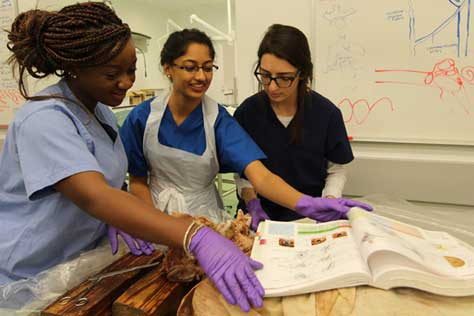As a Johns Hopkins faculty member, I have the privilege of teaching medical students and residents in the classroom and on the wards. I love participating in the learning process—helping students grapple with information, evaluate its potential for impact, and finally put it into play in their own careers and lives.
Through my role as vice president of academic affairs at Johns Hopkins Medicine International I also have the opportunity to contribute to educational planning and medical training activities at our global affiliates. They appreciate the importance of education to their success and sustainability, and they recognize that outstanding health care requires training future generations of clinicians and leaders.
Johns Hopkins was founded as a teaching and training institution and was the first in North America to formalize medical residencies. I believe it is our foundational philosophy of training and education that has contributed to our culture of excellence. I work very closely with my colleagues here and at the Johns Hopkins University School of Medicine, School of Nursing, Bloomberg School of Public Health and the Johns Hopkins Health System to get our clinical educators more deeply involved in spreading this philosophy through our international work.
Johns Hopkins’ clinical educators have traveled to our affiliates all around the world— Brazil, China, Lebanon, Mexico, Saudi Arabia, Singapore, the United Arab Emirates—to work on enhancing education and training opportunities. They get firsthand experience of health care and education in other medical environments, and they work with colleagues to develop competency-based training experiences, quantifiable educational milestones, faculty development programs and assessment methods. All along the way, they have the chance to broaden both their professional and personal viewpoints.
During these visits, our experts also participate in clinical education, including Grand Rounds or symposia, to share best practices with their international colleagues. They address packed auditoriums of colleagues who share our passion to improve the health of their communities. They stand elbow-to-elbow in clinics, wards and operating rooms to share clinical expertise with our counterparts in health systems similar to, yet distinct from, Johns Hopkins.
We constantly emphasize collaboration and education in our affiliations and have hosted visiting programs for faculty and trainees. We recently published a feature story about a radiologic technician working at Johns Hopkins Aramco Healthcare (JHAH) whose skills and positive attitude caught his supervisors’ attention. JHAH’s radiology administrator worked closely with us to arrange for the tech to take a six-month training in advanced MRI techniques in Johns Hopkins’ Department of Radiology and Radiological Science. He returned to JHAH with skills and techniques that have helped drastically reduce wait times for needed scans.
Additionally, we have programs to host affiliates’ clinicians who are seeking to bring new or advanced procedures to their home institutions, and observerships for residents from our affiliates to join our residency program activities.
It is a tremendous honor to work at Johns Hopkins and with our international colleagues. I’m constantly reminded that we all have a common mission to improve the health of our communities. Johns Hopkins Medicine International is providing collaborative opportunities that change caregivers’ lives profoundly, while also having an amplifying impact on so many others’ health and wellbeing.
